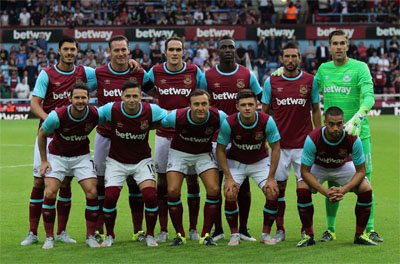West Ham United FC

|
| West Ham team in 2015. |
West Ham United FC — History, Legacy & Evolution
Origins — From Ironworkers to Football Club (1895–1900)
West Ham began as Thames Ironworks FC in 1895, a works team formed by Arnold Hills for shipyard labourers of the Thames Ironworks and Shipbuilding Company. The club symbolized industrial pride and community unity. In 1900, the team was reorganized and renamed West Ham United, marking the beginning of a new football identity.
The Birth of the Hammers Identity
The iconic crossed hammers in the club’s crest represent the heavy tools used by shipyard workers. This symbol became a powerful reminder of the club’s working-class roots — a badge of honour that shaped West Ham’s culture and fanbase for generations.
Upton Park — The Fortress of East London
For over 100 years, Upton Park (the Boleyn Ground) served as West Ham’s spiritual home. Known for its tight pitch, deafening atmosphere, and fiercely loyal fans, Upton Park was one of English football’s most intimidating venues. Generations of supporters grew up with Saturday afternoons under the claret-and-blue stands, making it a place full of memories, passion, and identity.
Early League Years & Rising Reputation (1900s–1950s)
In the first half of the 20th century, West Ham built a reputation for competitive football and solid performances. The club also reached the 1923 FA Cup Final — famously called the “White Horse Final” — where they narrowly lost to Bolton Wanderers in front of a record-breaking crowd at Wembley Stadium. These decades laid the foundation for the club’s future growth.
The Academy of Football — Golden Talent Production
West Ham’s youth system became legendary as the “Academy of Football”. It produced some of England’s greatest talents, especially those who shaped the nation’s 1966 World Cup victory — Bobby Moore, Geoff Hurst, and Martin Peters. Over the decades, the academy continued to deliver stars such as Frank Lampard, Rio Ferdinand, Joe Cole, Declan Rice, and Michael Carrick, cementing West Ham’s reputation as one of the best talent factories in football.
The Greenwood & Lyall Era — Technical Football & European Triumph
Managers Ron Greenwood and John Lyall transformed West Ham into a stylish, technical, and entertaining team. The club earned wide admiration for its elegant passing style and football philosophy. West Ham won the FA Cup in 1964, the European Cup Winners’ Cup in 1965, and another FA Cup in 1975, marking one of the most successful periods in club history.
The Famous 1980 FA Cup Triumph
West Ham’s 1980 FA Cup victory remains iconic. Under John Lyall, the team defeated Arsenal 1–0, becoming the last club outside the top division to win the FA Cup. This triumph strengthened the club’s legacy as a giant-slayer and a proud English institution.
Premier League Era — Highs, Lows & Unforgettable Moments
West Ham’s Premier League journey has been full of emotions: relegations, promotions, dramatic survival campaigns, and surprising European pushes. Iconic players like Paolo Di Canio, Carlos Tevez, Dimitri Payet, Mark Noble, and Michail Antonio gave supporters unforgettable moments, helping shape the club’s modern identity.
Moving to London Stadium — A New Era Begins
In 2016, West Ham moved from Upton Park to the London Stadium, a decision that symbolized long-term ambition and modernization. Despite mixed feelings from fans at first, the stadium has become a fortress in recent years, hosting European nights, big victories, and record attendances.
European Comeback — Europa League Success (2020s)
Under David Moyes, West Ham experienced a major resurgence. Strong Premier League campaigns were followed by deep European runs, including the 2022 Europa League semi-final and the historic 2023 UEFA Europa Conference League triumph, their first major European trophy in decades. This victory revived pride and brought back the spirit of the club’s golden years.
Modern Identity — Community, Loyalty & East London Pride
Today, West Ham United stands as a symbol of East London identity — tough, passionate, and proud. With a strong academy, ambitious projects, and a global fanbase, the club continues to balance tradition with modern growth. Whether at Upton Park or London Stadium, the spirit of the Hammers lives on.
The West Ham crest features the iconic crossed hammers — a tribute to the club’s ironworking origins — set against a modern shield symbolizing pride, tradition, and East London heritage.
